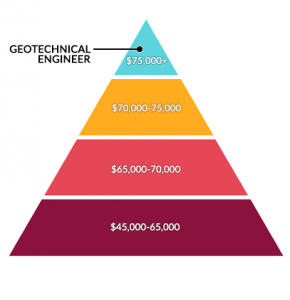Our Geotheta Statements
Our Geotheta Statements
Blog Article
Top Guidelines Of Geotheta
Table of ContentsThe Greatest Guide To GeothetaThe 7-Second Trick For GeothetaSome Known Incorrect Statements About Geotheta 4 Simple Techniques For GeothetaGeotheta Can Be Fun For Anyone

With experience and a proven performance history, you can advance to elderly engineering functions, project monitoring placements, and even begin your own working as a consultant. Constant expert advancement and remaining current with the current industry fads and innovations are crucial for job progression in this vibrant area. A career in geotechnical design supplies a varied variety of jobs and challenges, ensuring that no two days are the exact same.
In the office, you will examine data, prepare records, and team up with other experts - https://www.tumblr.com/geotheta/757702666915840000/geotheta-has-grown-exponentially-since?source=share. Fieldwork entails website visits, accumulating soil examples, performing geotechnical investigations, and managing construction activities. Depending upon the task, you might work on-site in differing weather and travel to various areas within the UK. As a geotechnical designer, your tasks might include website characterization, incline stablizing design, structure design, soil enhancement strategies, and geotechnical instrumentation and monitoring.
5 Simple Techniques For Geotheta
You will likewise interact with clients, contractors, and regulative authorities to resolve any kind of problems and guarantee compliance with market standards and policies. Geotechnical design can be tough, as it involves dealing with complicated dirt problems and dealing with possible risks to human life and infrastructure. Nevertheless, successfully resolving geotechnical problems and contributing to the growth of safe and lasting structures can be tremendously fulfilling.
If you're considering a profession in geotechnical engineering, below are some useful tips to assist you achieve success: Networking is vital for profession improvement in any kind of field, and geotechnical design is no exception. Signing up with expert organizations, such as the Establishment of Civil Engineers (ICE) and the British Geotechnical Association (BGA), can offer networking opportunities, accessibility to market events and conferences, and valuable sources for expert growth.

Creating solid interpersonal and administration skills will establish you apart and open doors to career development possibilities - https://www.indiegogo.com/individuals/37984319. Starting a profession as a geotechnical designer in the UK provides interesting prospects and the opportunity to contribute to the growth of the developed setting. By complying with the instructional paths, getting essential licenses and qualifications, and continuously honing your skills, you can build an effective occupation in this dynamic field
The 5-Minute Rule for Geotheta
When someone asks what I do and I tell them that I am a geotechnical designer, I typically get the follow-up inquiry of, "What is that?" Geotechnical design is a specialized branch of civil design that takes care of the science of the technicians of soil and rock and its applications.
In this short article, I will review the role of geotechnical design and the kinds of problems geotechnical designers resolve. Geotechnical designers (geotechs) are included in almost every kind of civil design project. Every framework is sustained by dirt or rock unless it is floating, flying, or dropping down.
Geotechs are generally most involved at the beginning of a job. Some of the tasks that a geotech may be accountable for are checking out subsurface conditions, establishing needed lab testing of soil and rock, analyzing the subsurface exploration results, and composing records that record the site problems and offer referrals for foundations, fill specifications, incline stability, etc.
Frequently, people do not desire to spend for geotechnical reports or design on smaller sized jobs, but the cost of a professional is typically more affordable than paying for comprehensive foundation Visit This Link fixings in the future. Geotechs are involved in the design of freeway cuts and loads, superficial and deep foundations, planet maintaining structures, embankments, passages, land fills, dams, slope stablizing systems, and sidewalk subgrades.
Geotheta Can Be Fun For Anyone

Sometimes, things that might not seem vital become important years later on when issues develop. Engineer of Record. One last thing to keep in mind: geotechnical engineering is married to geology. Despite exactly how great your engineering competence is, if something important is missed in the geologic characterization at a site, your experience might not conserve you
Vance, P.E., graduated from Marshall University with a Bachelor's Degree in Engineering and received a Master of Science in Civil Design from the University of Illinois at Urbana-Champaign. He is currently functioning towards a Ph. D. in Geological Design at Missouri University of Scientific Research and Modern technology. Jese functions as a geotechnical engineer who specializes in geohazards.
Excitement About Geotheta
Jese lives in West Virginia with his spouse and son. He enjoys creeping about on any landslide he can discover and investing time fly angling on the water. I hope you appreciated this week's article by visitor author Jese Vance.
Anthony Fasano, P.E.Engineering Monitoring Institute Writer of Engineer YourOwn Success. Civil engineering is the expert engineering self-control that takes care of the style, building and construction and upkeep of public and exclusive framework within the natural surroundings. Geotechnical design is a self-control within civil engineering that concentrates on the habits of natural geological materials in engineered systems. Geotechnical designers acknowledge that soil and rock are the cheapest and most bountiful building materials on Earth, and as a result play a major function in the building and construction and performance of every sort of civil design framework.
Report this page